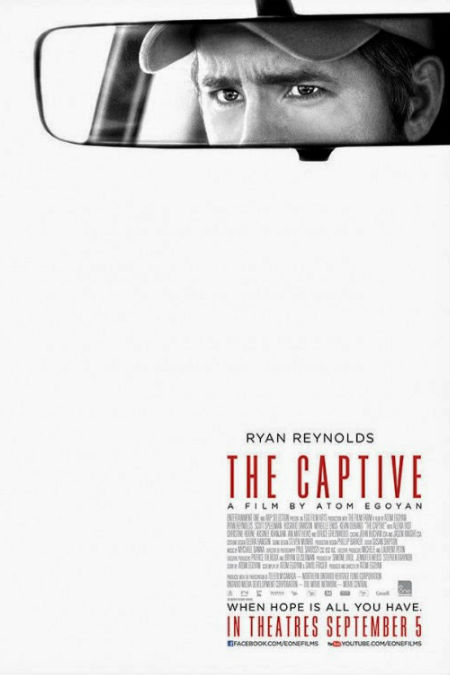
If there is one thing that can be said for Atom Egoyan’s movies of late, it is that he has not surrendered the immersive visual or narrative style that made his name with movies like Exotica (1994) and The Sweet Hereafter (1997).
His latest film, The Captive, starring Ryan Reynolds as Matthew, a devoted dad who finds his world completely upended when his 9 year old daughter Cass (Peyton Kennedy/Alexia Fast) is abducted from his truck outside a diner while he’s buying a pie for dinner, retains all the hallmarks of his singularly engaging look.
It has the usual chopped-up and randomly-scattered narrative, which sees events and information parcelled out in non-chronological order to pleasing, if occasionally confusing effect, and a lush, chilled, both atmospherically and literally, sheen courtesy of cinematographer Paul Sarossy, which together create a sense that something terrible this way comes.
It is doom spelled out in snowdrifts and icily-exchanged conversations, tension as a constant state of being, suspicion as a default way of dealing with those around you, and it all looks and feels impressively epic and yet suffocatingly intimate all at the same time.
As a means of examining what happens to Matthew and his wife Tina (Mireille Enos) in the aftermath of their daughter’s disappearance, the sundering of their once-close bond as the police in charge of the investigation, Nicole (Rosario Dawson) and Jeffrey (Scott Speedman) who are part of a taskforce formed to hunt down pedophiles online, indirectly point the finger of blame at Matthew, it is damn near perfect.
You can almost see Matthew’s shutdown persona, his obsession with driving the same road over and over hoping to spot Cass, mirrored in the icy terrain, his locked away but fragile and jumbled emotions represented by the stop, start and back again narrative that clues you in something, often before it’s happened.
Style-wise then you can hardly fault The Captive which draws you in and doesn’t let go.
Substance-wise however it is a whole different story.
Initially Egoyan, who penned the script, does a fine job of showing people coming apart at the seams, trying to keep their day to day lives going even as the lynchpin of it, the bright, effervescent Cass, who is alive and an unwilling now-teenage accomplice to her Mozart-loving captive Mika (Kevin Durand) who moves and talks like a wax dummy come grudgingly to life, remains obdurately missing.
Tina particularly, who blames Matthew almost immediately for the loss of Cass, is being systematically undone by the leaving of items from Cass’s childhood, including a trophy from her ice skating days and a brush she used to love, in the hotel rooms she cleans.
She is unaware she is watched in some sort of macabre, sick game by Mika, who seems to gain some sort of twisted pleasure from the physical imprisonment of Cass and the emotional torture of her mother, which he watches on a series of cameras mounted in air-conditioning vents.
It is all deeply unsettling and utterly perverse and it’s hard to know which is more distressing – Tina’s gradual descent into a form of madness or Mika’s calm, unruffled observance of it, his reactions no different than if he was watching a wildlife documentary.
As an exercise in what happens when people are pushed to the edges of their ability to cope, and an insight into the monsters who gain pleasure, however muted, from watching it happen, it is beyond compare, gripping filmmaking which takes a long, hard look at the human condition and finds it a fragile creature indeed.
As a thriller however, which it reputedly is, it fails to generate any real tension or emotional engagement.
Its pleasing stylistic flourishes come at the expense of any sense of what many of the characters are thinking, of any deep exploration of what they’re feeling and going through, with only Matthew emerging with any sort of beating heart.
You can intellectually sense that Tina must be distraught beyond the ability to cope, and that Nicole and Jeffery are heavily invested in the work they do – the B plot which sees Nicole abducted at one point by Mika is a distraction and ultimately fails to go anywhere meaningful – but there is no real investment in what anyone is going through, which is profoundly odd given what is at stake here.
It is only the scenes involving Matthew, rendered with a brittle but determined sensibility by Reynolds in likely the finest performance of his career, who really gives us a window in how traumatic this entire event is for everyone involved.
The problem seems to be one of style triumphing over substance, of look and feel taking precedence over what could have been a searing look into the dark underbelly of society where people indulge their twisted desires, seemingly one step ahead of the authorities who seem to be scrambling to play catch up.
All the tension, the fear, the mourning of what has been lost is leached out of The Captive by its moody, distance-inducing persona, a real pity because somewhere beneath the impressively glossy sheen is a real, engrossing story just waiting to fully express itself.
It is unfortunately, for all the movie’s plus points, never quite given the chance.